Introduction
An understanding of the natural world and what's in it is a source of not only a great curiosity but great fulfillment.
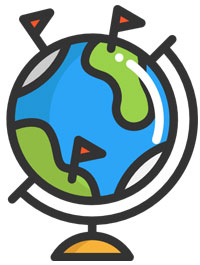 Geography inspires students to think about their world differently. Students think critically. They question. It inspires students to think deeply and develop a curiosity about the world we live in.
Geography inspires students to think about their world differently. Students think critically. They question. It inspires students to think deeply and develop a curiosity about the world we live in.
Geography broadens horizons. It engages them with their local, but opens their eyes to the global; the wonders and challenges of the world they have not yet been exposed to. It is about developing new experiences of the world, inside and outside of the classroom.
Geography is relevant to them. It questions their citizenship and their role in the world. It exposes them to the idea of sustainable futures. It encourages students to think deeply about the world we want and the ways in which it can be achieved. It is forward thinking.
Whether Geographers continue past KS3 or not, they will all have gained useful and relevant knowledge. They will be equipped with a wide range of important literacy, numeracy, cartographic skills, data analysis and evaluation skills that will make them highly employable in future. As the world becomes more conscious of our impact on the environment, and the 'green revolution' expands, we need young people to have a powerful knowledge and an acute understanding of our world to make informed and compassionate decisions on the future of our planet.
Staff
Mrs J Hitchmough - Head of Department
Mr C McGarry - Assistant Head Teacher
Mr J Halewood - Duke of Edinburgh Leader
Miss S Moss - teacher of Geography
Programme of Study KS3
Geography inspires students to think about their world differently. Students think critically. They question. It inspires students to think deeply and develop a curiosity about the world we live in.
Geography broadens horizons. It engages them with their local, but opens their eyes to the global; the wonders and challenges of the world they have not yet been exposed to. It is about developing new experiences of the world, inside and outside of the classroom.
Geography is relevant to them. It questions their citizenship and their role in the world. It exposes them to the idea of sustainable futures. It encourages students to think deeply about the world we want and the ways in which it can be achieved. It is forward thinking.
Whether Geographers continue past KS3 or not, they will all have gained useful and relevant knowledge. They will be equipped with a wide range of important literacy, numeracy, cartographic skills, data analysis and evaluation skills that will make them highly employable in future. As the world becomes more conscious of our impact on the environment, and the 'green revolution' expands, we need young people to have a powerful knowledge and an acute understanding of our world to make informed and compassionate decisions on the future of our planet.
Programme of Study KS4
Head of Department: Mr C McGarry
Contact email address: mcgarryc@broughtonhall.com
Specification: AQA
Qualification: GCSE Geography
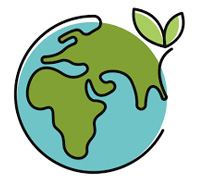 Broughton Hall follows the AQA Specification for Geography (8035). The course is split into 3 components; living with the physical environment, challenges in the human environment and geographical applications.
Broughton Hall follows the AQA Specification for Geography (8035). The course is split into 3 components; living with the physical environment, challenges in the human environment and geographical applications.
Living with the Physical Environment
- Section A: The Challenge of Natural Hazards
- Section B: The Living World
- Section C: Physical Landscapes in the UK
The living with the physical environment unit equips students with a detailed understanding of the world. Students explore geographical processes and the resultant landforms. They explore a wide range of environments around the world, from physical landscapes in the UK (rivers and coasts), tropical rainforests, hot deserts to significant tectonic events (both earthquakes and volcanoes). Critically, students examine the importance of these processes by understanding how they impact humans and the ability of humans to manage them.
Challenges in the Human Environment
- Section A: Urban issues and challenges
- Section B: The changing economic world
- Section C: The challenge of resource management
The challenges in the human environment unit helps develop a student's understanding of human processes, systems and outcomes that exist in our world. Students examine a wide range of concepts and consider how they compare in different parts of the world. Students examine places at a range of scales; from local to global which include urban environments as well as places which are at different stages of economic development. In addition to this students study resource management; focusing on issues around food, water, and energy. The concepts studied are contemporary, addressing the key issues of the world right now. Students examine the issues, impacts and the management, providing them with up-to--date knowledge and understanding of real-world issues.
Geographical Applications
- Section A: Issue evaluation
- Section B: Fieldwork
A critical element of the course which helps to equip students with a range of skills which are not only important for success in Geography, but also a variety of careers. Designing an enquiry, data analysis, evaluation and problem solving are key components of this unit and develop these key, transferrable skills within our Geographers. Students are directed to evaluate a key contemporary issue in geography through the study of pre-release material which they can then use in the exam. Students also complete 2 fieldwork enquiries, one in a human context and another in a physical context. Students develop their enquiry skills, selecting appropriate data analysis and presentation skills before making valid conclusions underpinned by geographical theory.
How is the course structured & assessed?
The course is studied over 2 years and is assessed at the end of the course with three exam papers. There is no coursework in GCSE Geography.
At the end of year 10, students will complete their fieldwork enquiries.
| Paper 1: Living with the Physical Environment |
1hr 30m exam - 88 marks
35% of GCSE qualification
|
| Paper 2: Challenges in the Human Environment |
1hr 30m exam - 88 marks
35% of GCSE qualification
|
| Paper 3: Geographical Applications |
1hr 30m exam - 76 marks
30% of GCSE Qualification
|
What can these qualifications lead to?
As our understanding and appreciation for the world we live in continues to grow, prospects in Geography increase. Many of the significant issues we face around the globe can only truly be addressed when viewing them through a geographical lens. The demand for Geographers who are understanding of the complexities of our world, has never been so high.
Geography is a highly employable qualification, which opens up a wide range of careers. Geography graduates have one of the highest rates of graduate employment. The subject supports the development of a wide range of transferable and highly employable skills, such as data analysis, evaluation, decision-making and problem solving. Geography, as a varied and contemporary choice, also complements well with a wide range of subjects as it balances between the sciences and the arts.
Careers which lead from Geography:
www.rgs.org/geography/choose-geography/careers
www.geography.org.uk/Jobs-and-careers-in-geography
Programme of Study KS5
Key Information
Level: A Level
Examination Board: AQA
Subject Leader: Mr McGarry
Entry Requirements
Students will need to have achieved a grade 6 or above in Geography. It is also preferable that students have achieved a grade 6 in English.
Why Choose this course?
Geography gives us a different view and different way of looking at the ever changing world in which we live. It encompasses a wide range topics both physical and human and touches on many contemporary themes and issues which affect our world today. It is a multi-faceted subject with a wide range of skills which are developed. The subject is highly regarded by Universities and Employers because of these analytical skills which are transferrable to many different subjects and jobs.
Prospects
Geography provides students with a well-rounded skillset which is attractive to a lot of potential employers. There are geographical-related careers which involve a strong understanding of the environment, for example, environmental managers, town and country planners, environmental lawyers and much more.
However, Geographer enter the world of work with an extensive set of skills which are important for a range of employers outside of the environmental sphere. Geographers develop skills in analysis, evaluation and decision-making which are sought-after characteristics in leadership and management amongst other desirable careers.
Geography also complements a range of other subjects including, English, Maths, Science, Business and History.
Course Content
A-level Geography comprises of three key strands; physical geography, human geography and a geographical fieldwork investigation (NEA).
Physical Geography:
The Water and Carbon Cycles
Coastal Systems and Landscapes
Hazards
Human Geography:
Global Systems and Global Governance
Changing Places
Contemporary Urban Environments
Geography Fieldwork Investigation:
Geography students complete a minimum of four days fieldwork and will use their geographical fieldwork skills to complete their own geographical investigation. Students have the opportunity to choose an area of the subject they are most interested in, which gives students freedom to explore their local environment.
Course Opportunities/ Activities
Geography at Broughton Hall Catholic High School opens up a whole range of enriching activities to participate in. As part of the course, you will undertake a minimum of four days of fieldwork experience. Students also complete their NEA which is an engaging project in which students can focus on an area of their personal interest and complete their own investigation. This is an excellent opportunity to prepare students for university study. In addition, revision sessions are provided to support students in their acquisition of geographical knowledge.
Support and Challenge
The course is sequenced to gradually help students build up a strong array of geographical skills. Students develop a powerful knowledge in the subject and as the course progresses students are challenged with more synoptic based questions. Our most-able students are supported through extra reading and model answers to demonstrate how they can access the highest marks. Intervention takes place in geography through additional revision to help students to achieve the highest grade possible.

 Geography inspires students to think about their world differently. Students think critically. They question. It inspires students to think deeply and develop a curiosity about the world we live in.
Geography inspires students to think about their world differently. Students think critically. They question. It inspires students to think deeply and develop a curiosity about the world we live in.
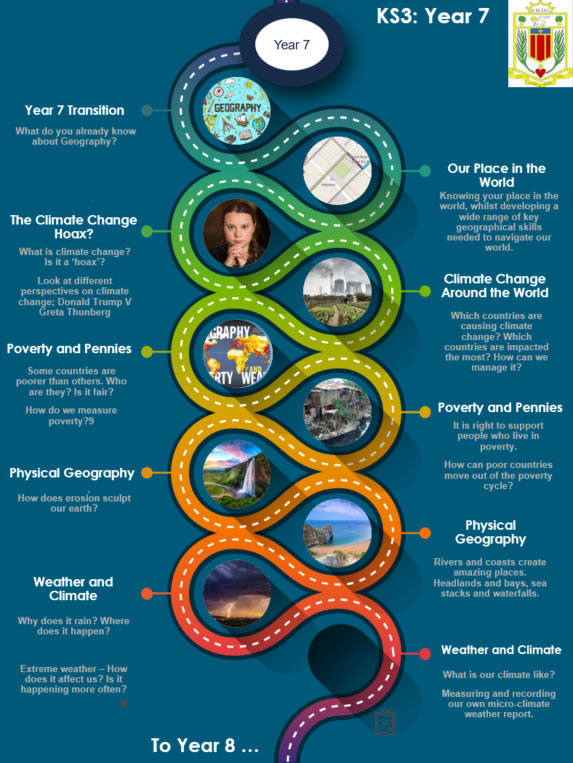
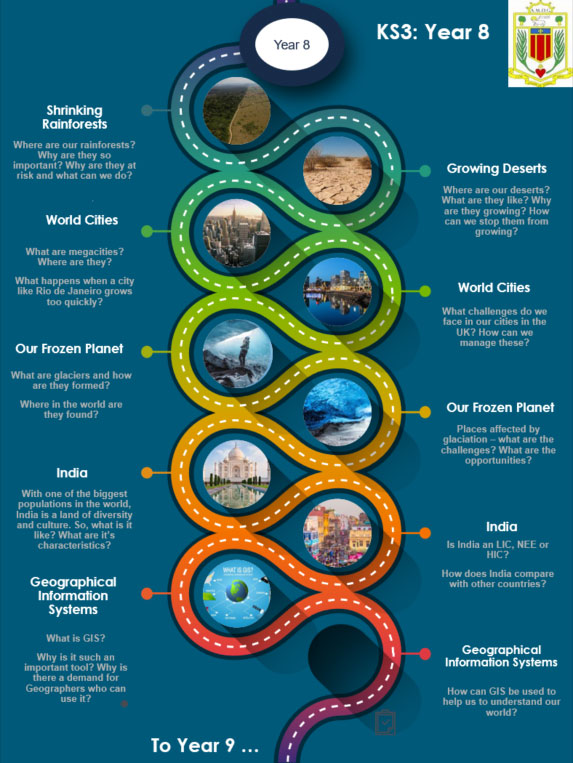
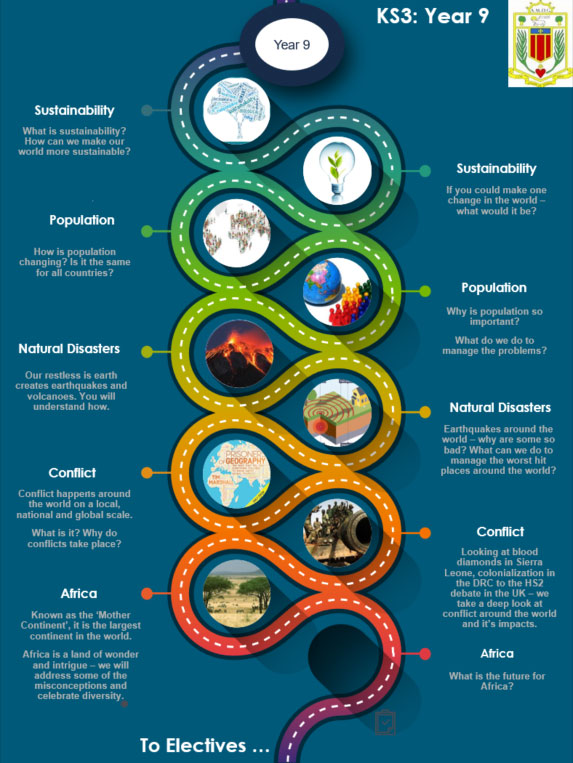
 Broughton Hall follows the AQA Specification for Geography (8035). The course is split into 3 components; living with the physical environment, challenges in the human environment and geographical applications.
Broughton Hall follows the AQA Specification for Geography (8035). The course is split into 3 components; living with the physical environment, challenges in the human environment and geographical applications.